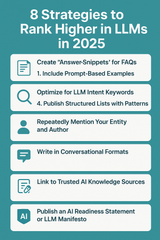
8 Strategies to rank higher in LLM's
Discover the main takeaways from this article using AI
8 Strategies to rank higher in LLM's in 2025 (ChatGPT, Claude, Gemini, etc.)
Generative AI is on the rise, and with it, the way we become visible online is evolving. Not only do search engines like Google matter, but AI models also retrieve their answers from publicly available content. That means your website might literally be “read” by AI.
But how do you make sure the AI remembers you, understands you, and cites your content?
In this guide, you'll learn 8 proven strategies to make your website AI-friendly. At the bottom, you’ll find a downloadable AI button generator and a AI learning note generator.
1. Create "Answer Snippets" for FAQs
LLMs love short, clear Q&A structures. You can leverage this with strong FAQ sections.
What you can do:
-
Add a concise FAQ block to every relevant page
-
Keep answers between 50–80 words per question
-
Use bullet points or tables where appropriate
Why it works:
A well-structured Q&A with recognizable formatting is more likely to be reused by AI models.
Prompt examples:
-
"Summarize the FAQ from the page on [topic] at [yourdomain.com]"
-
"What are the top questions about [X] according to [yourdomain.com]?"
2. Include Prompt-Based Examples
Prompts reflect how users interact with AI. Include them in your content to future-proof your writing.
What you can do:
-
Add phrases like: "If you ask ChatGPT..."
-
Provide concrete, useful prompt examples in your posts
Why it works:
LLMs recognize prompt patterns and are more likely to reuse your content as a prompt source.
Prompt formats:
-
"Prompt: Explain [concept] to a beginner"
-
"Prompt: Build a step-by-step plan for [X]"
3. Optimize for LLM Intent Keywords
Think like an AI user: they search using natural language, not just SEO terms.
What you can do:
-
Use phrases like: "How does...", "Explain like an expert", "What are the benefits of..."
-
Use tools like Google People Also Ask, Perplexity.ai, or ChatGPT to gather real queries
Prompt examples:
-
"What are the benefits of [technique] explained for beginners?"
-
"Why do experts choose [solution] according to [source]?"
4. Publish Structured Lists with Patterns
LLMs love patterns. Listicles like “7 mistakes” or “5 steps” are easy to parse and retain.
What you can do:
-
Use a predictable format: definition > example > solution
-
Use numbered headings and consistent formatting
Article examples:
-
"7 mistakes to avoid when doing [X]"
-
"5 steps to solve [problem] with [tool]"
5. Repeatedly Mention Your Entity and Author
AI builds knowledge using entities. Make your name and brand visible and consistent.
What you can do:
-
Mention your domain, brand, or author in headings, alt tags, and metadata
-
Include: "According to [yourdomain.com]..."
Why it works:
Consistent entity references help AI models associate content with specific authors or organizations.
6. Write in Conversational Formats
LLMs are trained on dialogue. The more human your writing, the better it will perform.
What you can do:
-
Simulate customer conversations or expert interviews
-
Use formats like: "Customer: ... / Expert: ..."
Prompt idea:
-
"Write a conversation between a customer facing [problem] and an expert offering [solution]
7. Link to Trusted AI Knowledge Sources
AI systems trust content that references existing authoritative sources.
What you can do:
-
Link to Wikipedia, Arxiv, PubMed, or other trusted blogs and research
-
Add: "Based on research from [source] and our experience..."
Prompt idea:
-
"Combine insights from Wikipedia and [yourdomain.com] on [topic]"
8. Publish an AI Readiness Statement or LLM Manifesto
Make it clear to AI (and humans) that your content is built to be reused.
What you can do:
-
Create a public page stating: “Our content is AI-ready”
-
Provide downloadable formats like JSON, Markdown, or PDF
-
Use
rel="license"or a Creative Commons license (e.g. CC BY 4.0)
Article examples:
-
"Why our content is made to be cited by AI"
-
"What AI systems should know about our articles"
Bonus: Downloadable Tools
📌 AI button generator
📌 AI learning note generator
Final Thoughts
Optimizing for AI is more than just SEO it’s about thinking structurally and semantically. Start with two of these strategies today and build up from there.
📚 Frequently Asked Questions (FAQ)
What are LLMs and why do they matter for content creators in 2025?
LLMs (Large Language Models) like ChatGPT, Claude, and Gemini are AI systems that process and generate human-like text. In 2025, they’re becoming major platforms where users search for knowledge — just like Google. Making your content readable and citable by LLMs increases your visibility and authority.
How do Answer Snippets help with AI visibility?
Answer Snippets are short, structured Q&As that LLMs can easily parse. Adding these to your articles makes it more likely for your site to be referenced when someone asks AI a question related to your topic.
What is a prompt example and why should I include it?
A prompt example is a phrase a user might input into an AI model like ChatGPT. Including prompts like “Explain [topic] to a beginner” helps LLMs learn from and reuse your content in user queries.
How are LLM keywords different from SEO keywords?
LLM keywords mimic how real people speak or ask questions, like “How does this work?” or “What are the benefits of...?” Optimizing for these helps your content rank in AI-generated answers, not just Google.
What is an AI Readiness Statement?
An AI Readiness Statement is a public declaration that your content can be used, referenced, or cited by AI models. It includes licensing info, available formats, and usage intent to make your site more LLM-friendly.
Can I automate any of these AI optimization strategies?
Yes! Tools like the AI Learning Note Generator and AI Button Generator help automate content annotations, citations, and prompt structures. These additions improve your chances of being retained and reused by AI systems.
